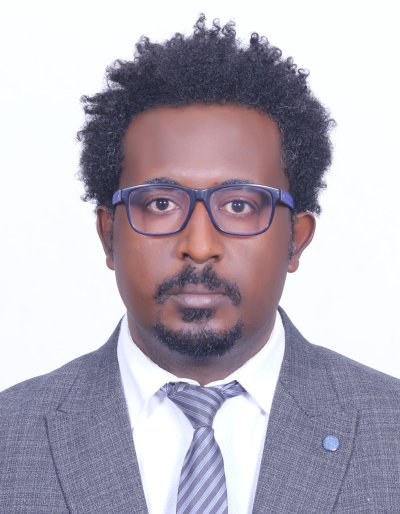
Dawit Getachew Assefa has a Master of Science Degree from Addis Ababa University in Ethiopia, and serves as a Clinical Trials Specialist. Since 2017, he has been imparting knowledge at Dilla University, Ethiopia. Additionally, he has practical experience as a Professional Nurse at Dilla University Referral Hospital and Sekota District Health Center.
In his professional tenure, he has served as a principal investigator in a measles vaccine adverse event surveillance trial in Ethiopia and as a Research Nurse at KNCV Tuberculosis Foundation, contributing to multi-country clinical research on TB Prevention therapy for people living with HIV.
Throughout his career, Dawit has amassed expertise in clinical research and evidence synthesis, including systematic reviews, meta-analyses, and network meta-analyses. His primary research interests revolve around poverty-related infectious diseases and neglected tropical infectious diseases, with a particular focus on malaria and tuberculosis.
Dawit joined IDDO/WWARN as a WHO/TDR Fellow in 2024, and worked until February 2025 on the comparative effectiveness of Artemisinin Combination Therapy on haemoglobin recovery and gametocyte clearance in P. falciparum.

Emmanuelle joined the Senior Management Team at IDDO in December 2023. As Senior Operations and Development Manager, she provides leadership to programme management and operations activity across IDDO’s portfolio of infectious disease research themes and data repository. She also oversees the governance of the organisation, and supports its strategic development including funding, communications and partnerships.
Emmanuelle has an MRes in Molecular and Cellular Immunology with a specialisation in Virology from University Paul Sabatier in Toulouse, France. She carried out a PhD in genetics at the WCHG in Oxford, developing the first prenatal diagnosis for a severe congenital immune and skin disorder. She then moved to the MRC Functional Genomics Unit, working in neurosciences on new therapeutic pathways for aggressive forms of blood cancer in children, before joining the Department of Statistics.
In the past 10 years, she managed the strategies, operations, and governance of multidisciplinary programmes in cancer and infertility across experimental and computational biology, including building and leading new research and preclinical validation platforms in academia and the industry.
Estimating the proportion of relapse following treatment of Visceral Leishmaniasis: meta-analysis using Infectious Diseases Data Observatory (IDDO) systematic review
Summary
Background
Occurrences of relapse after 6-months post-treatment has been reported in recent Visceral Leishmaniasis (VL) efficacy studies. A meta-analysis was carried out to quantify the proportion of relapses observed at and beyond 6-months using the Infectious Diseases Data Observatory (IDDO) systematic review (SR) database.
Methods
Studies in the IDDO SR database (1983–2021; 160 studies) were eligible for inclusion if follow-up was at least 6-months, relapse was clearly reported, and patients with HIV coinfections were excluded. Meta-analysis of single proportion was undertaken and the estimates were reported with 95% confidence intervals (CI).
Findings
Overall, 131 studies enrolling 27,687 patients were included; 1193 patients relapsed. In the Indian sub-continent (ISC), relapse estimates at 6-months was 4.5% [95% CI: 2.6%–7.5%; I2 = 66.2%] following single dose liposomal amphotericin B (L-AmB) and 1.5% [95% CI: 0.7%–3.3%; I2 = 0%] for L-AmB in a combination therapy. In East Africa (EA), corresponding estimates were 3.8% [95% CI: 1.3%–10.9%; I2 = 75.8%] following pentavalent antimony (PA), and 13.0% [95% CI: 4.3%–33.6%; I2 = 0%] for PA + paromomycin. From 21 studies with follow-up longer than 6-months, 0.6% [95% CI: 0.2%–1.8%; I2 = 0%] of patients relapsed after 6-months and estimated 27.6% [95% CI: 11.2%–53.4%; I2 = 12%] of relapses would have been missed by a 6-month follow-up.
Interpretation
The estimated relapse proportion ranged from 0.5% to 4.5% in ISC and 3.8%–13.0% in EA with the currently recommended drugs. Over one-quarter of relapses would be missed with 6-months follow-up suggesting a longer follow-up may be warranted.
Funding
Wellcome Trust (ref: 208378/Z/17/Z).
New meta-analysis finds six month follow-ups miss quarter of visceral leishmaniasis relapses
A meta-analysis of nearly 30,000 patients suggests that a post-treatment follow-up duration of longer than 6-months may be needed to identify visceral leishmaniasis relapses.
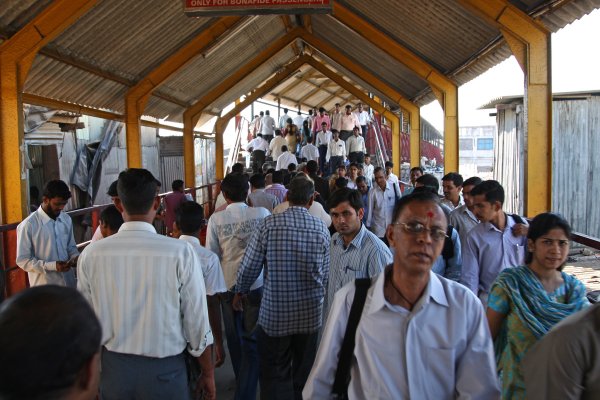
Visceral Leishmaniasis (also known as Kala Azar across the Indian subcontinent) is a protozoan parasitic disease which causes fever, weight loss, fatigue and anaemia. It is fatal in over 95% of the untreated cases, but the right treatment significantly reduces deaths and disease effects.
However, relapses after treatment, with clinical symptoms returning months later, remains a major public health concern. Quantifying these relapses is important to control the spread of the disease, so IDDO researchers in collaborations with colleagues working in the field undertook a large scale meta-analysis to generate a baseline estimate of relapses in patients who have been treated.
The research team used the Infectious Diseases Data Observatory (IDDO)’s library of visceral leishmaniasis clinical studies: this library is a living systematic review updated on a periodic basis to indicate relevant publications indexed by major research databases in the field.
“We extracted data from the studies indexed in the IDDO’s library of visceral leishmaniasis clinical studies and analysed them to estimate the proportion of patients who showed signs of the disease returning after treatment had been completed,” said IDDO’s Dr Prabin Dahal, one of the study authors.
This analysis found that the rates of relapse varied widely, depending on where the patients lived and the exact drug regiment used for the treatment – between 0.5% and 4.5% of patients in the Indian subcontinent showed signs of the disease returning, but for East Africa, as many as 13% of the treated patients had recurring symptoms.
“Patients were also less likely to relapse after treatment with a combination of drugs, rather than single drug”, said IDDO’s Rutuja Chhajed, the study’s first author. The study also highlights previous work suggesting that a combination of drugs might work synergistically to reduce relapse rates as well as treatment duration for visceral leishmaniasis treatment, potentially helping to alleviate the burden on healthcare systems.
“21 of the studies we analysed followed up patients for longer than the standard six months, and based on these studies, we estimate that more than 27% of the relapses were being missed in the six month follow up,” said Dr Prabin Dahal. “Prompt identification and treatment of relapsing visceral leishmaniasis remains priority for the Kala Azar elimination programme in the Indian subcontinent and other regions as they provide an infective pool of the parasite to fuel disease transmission. We think that a longer follow-up duration is needed in future studies of visceral leishmaniasis to capture the late relapses, which remains crucial for disease control”.
Read the full paper in the Lancet Regional Health - SouthEast Asia.
Find out more about our work on Visceral Leishmaniasis, and access our free database.
Join IDDO’s team at ECTMIH 2023
IDDO and WWARN are delighted to be taking part in this year’s 13th European Congress on Tropical Medicine and International Health, (ECTMIH), and will be sharing our latest research across visceral leishmaniasis, malaria, medicine quality and lymphatic filariasis.
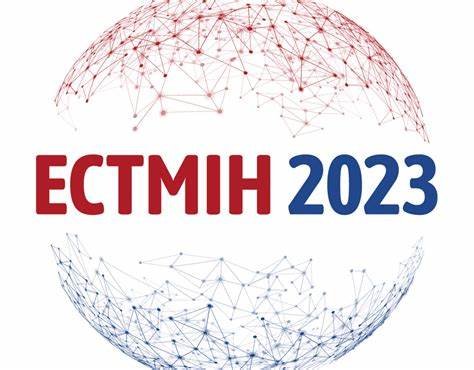
This year’s meeting, in Utrecht, will focus on shaping the future of equitable and sustainable planetary health.
IDDO’s researchers will be presenting our latest research at a series of oral presentations and via e-posters.
Oral presentations
Tuesday, November 21
Join IDDO’s team at Tivoli Vredenburg Cloud Nine Track 2, from 10:30am (Central European Time CET), for a presentation on 'Safety and efficacy of primaquine in patients with P. vivax malaria from South Asia: A systematic review and individual patient data meta-analysis'
Thursday, November 23
Watch two presentations on visceral leishmaniasis on, at the Social Impact Factory Room 3, from 10.30am CET
- Host, parasite and drug determinants of treatment outcomes in Visceral Leishmaniasis: An individual patient data meta-analysis using the Infectious Diseases Data Observatory data platform
- Haemoglobin dynamics following treatment of Visceral Leishmaniasis: An individual patient data meta-analysis using the Infectious Diseases Data Observatory data platform
Join IDDO at 3.30pm CET in the Tivoli Vredenburg Hertz, Track 2, for our presentation ‘Systematic review and geospatial modelling of molecular markers of resistance to artemisinins and sulfadoxine-pyrimethamine in Plasmodium falciparum in India'
Posters
- Ophthalmological Complications in Visceral Leishmaniasis and Post Kala-Azar Dermal Leishmaniasis: A Systematic Review of Published Literature
- Lymphatic filariasis treatment studies: the case for an individual participant-level data platform
- Navigating the Neglected Crystal Ball: A Systematic Review of Prognostic Models in Visceral Leishmaniasis
- Substandard and falsified vaccines and their detection
ECTMIH, which takes place from November 23 to 23, provides a platform for experts, scientists and researchers to present scientific developments and breakthroughs in tropical medicine and global health, and strengthens networks and creates new partnerships.
If you are not able to join us in-person then why not follow what is happening at the conference over Twitter by following us on @IDDOnews
Read our latest news or email info@iddo.org with your questions.
IDDO and WWARN Director receives ASTMH medal
Professor Philippe Guérin, IDDO and WWARN’s Director, has been awarded the Bailey K. Ashford Medal for his “distinguished” work in tropical medicine.
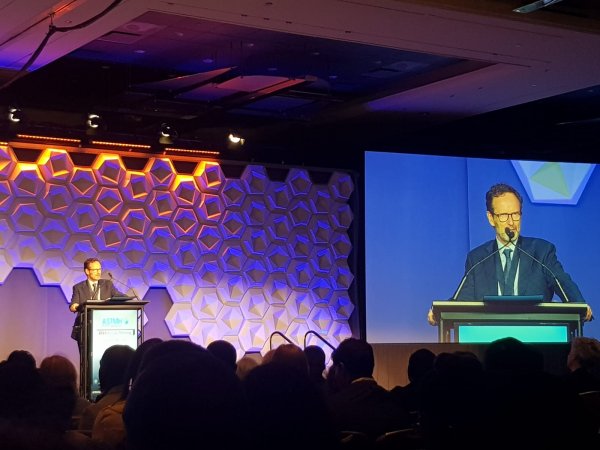
The American Society for Tropical Medicine and Hygiene (ASTMH ) President Daniel G. Bausch presented the medal at a ceremony at the Hyatt Regency Chicago, on the opening day of the 72nd annual meeting of the society
Professor Guérin was nominated for the award by Dr Abib Abera, of Addis Ababa University (AAU), Ethiopia, to mark his 25-year career in the field of tropical medicine where he has led research in clinical trials and epidemiology to improve outcomes for some of the world’s most vulnerable populations.
He began his career as a physician working in France and Nepal, before joining Médecins Sans Frontières where he worked in the field in many countries in Africa and Asia. He later moved into research and held a number of posts with the Wellcome Trust Oxford Research Unit in Thailand, the Department of Infectious Disease Epidemiology at the Norwegian Institute of Public Health, and Épicentre in Paris - a World Health Organization (WHO) Collaborating Centre for Research in epidemiology and response to emerging diseases.
Philippe’s interest lay in research and how data could be better used to further research. He has been the director of the WorldWide Antimalarial Network (WWARN) since its inception. WWARN is a collaborative data platform generating innovative resources and reliable evidence to inform the malaria community on the factors affecting the efficacy of antimalarial medicines. In 2016, Philippe established the Infectious Diseases Data Observatory (IDDO), focusing on neglected tropical diseases and emerging infections to provide an environment for equitable sharing of data, methods and infrastructure to generate evidence that improves outcomes for patients worldwide.
The Bailey K. Ashford Medal is named in honour of Bailey K. Ashford who recognised the connection between hookworm infection and anaemia at the age of 26.
Philippe said “I am thrilled to be awarded this medal, which is more of a recognition of the hard work of the very many people I have worked with throughout my career.”
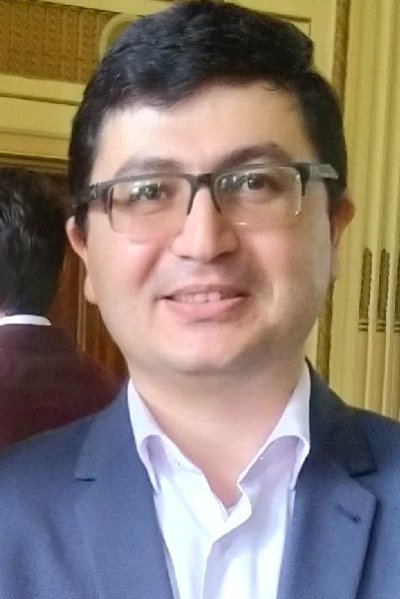
Dr Farhad Shokraneh has 20 years of experience and a PhD in Evidence Synthesis. He joined IDDO in October 2023 as Evidence Synthesis Manager.
Previously, he has worked at the University of Nottingham, King's College London, University College London, UCLH, and Cambridge University in similar roles. He has led teams to deliver projects to clients such as WHO, UN, UNICEF, FDA, UK NIHR, Cochrane, AWMF, and NICE.
As a passionate methodologist and change maker, Farhad is a co-author of the Cochrane Handbook, an editor of Systematic Reviews journal and has designed the first and most sensitive search strategy for COVID-19 literature and the first living search strategy and coined concepts such as 'Search-Resistant Concepts', 'Search Pyramid', 'Living Search Strategy', and 'Iterative Systematic Reviews'.
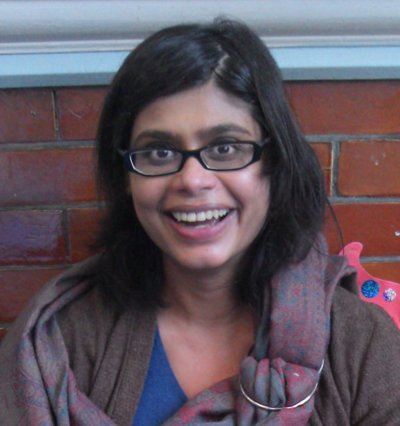
Dr Charvy Narain holds a doctorate in Neurosciences from the University of Oxford, and has worked in research communications for over 15 years. In her currently role as Communications Manager for IDDO, she provides strategic communications advice and implements IDDO's communications strategy across various communications channels, including the IDDO website and social media. She also line manages the IDDO communications officer.
IDDO’s team looks forward to sharing its latest research at ASTMH
Join IDDO and WWARN’s researchers at this year’s ASTMH - the 72nd annual meeting in Chicago, USA, where we will be presenting on Visceral Leishmaniasis, malaria, and medicine quality across symposia, oral presentations and posters.
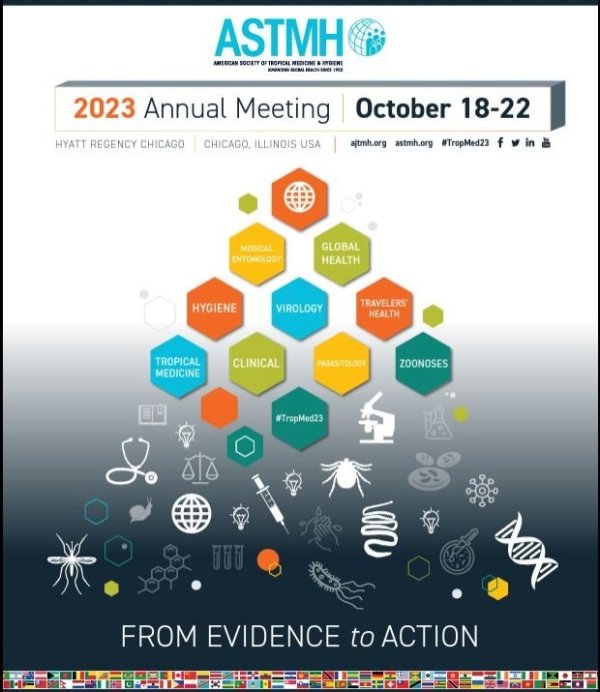
This year IDDO will be at stand #305, as part of Oxford Tropical Medicine, University of Oxford. Come and see us to find out about more about our research, data platforms and latest work.
Symposia - October 20
IDDO’s team is hosting a symposium titled: ‘From a single dataset to a million patients: Solutions to pool and harmonise IPD for effective and equitable reuse of data to generate new evidence in an open science framework’. Taking place on Friday, 20 Oct 4.00pm to 5.45pm (CST) the symposium will be chaired by Professor Philippe Guerin and Dr Manju Rahi, with presentations by:
Kalynn Kennon: Solutions to open science and data reuse;
- Dr Rob Terry: Governance of data reuse
- Dr Rob Commons: The impact of data reuse in malaria
- Maria Jesus Pinazo: The impact of data reuse in NTDs
- Professor Phaik Yeong Cheah: Applications and next steps in new environments
Symposia - October 22
IDDO’s Medicine Quality Research Group will host a symposium titled 'Countering the Wicked Problem of Bad Quality Medicines'. It has been organised by Professor Marya Lieberman, of U. Notre Dame, USA, and Professor Paul Newton and takes place on Sunday, October 22, at 8am (CST)
The presentation topics are systems/supply chains, pharmaceuticals and medical products and include:
Systems/Supply chains:
- Ashley Lee presenting on behalf of Professor Sachiko Ozawa, of the University of North Carolina Eshelman School of Pharmacy (UNC): Modelling the economic and clinical impact of substandard and falsified drugs
- Dr Céline Caillet, University of Oxford-MORU Tropical Health Network/Infectious Diseases Data Observatory: An app (Epione) for facilitating medicine quality surveys
Pharmaceuticals:
- Dr Noudy Sengxeu (University of Health Sciences, Vientiane, Lao PDR): ABACUS2-MQ Survey of the quality of antibiotics in four countries
- Dr Ayenew Ashenef (pre-recorded talk), Addis Ababa University--Department of Pharmaceutical Chemistry and Pharmacognosy: Quality of chemotherapy drugs in Ethiopia
Medical products:
- Dr Céline Caillet, presenting on behalf of Professor Paul Newton, University of Oxford-MORU Tropical Health Network/Infectious Diseases Data Observatory: Evaluation of devices for detecting substandard and falsified vaccines in supply chains
This symposium will also include a Poster Session and ‘petting zoo’ for medicine screening devices.
There will be an informal meeting of those interested in medicine quality research, policy and implementation from 11am to 2.30pm, on Saturday, October 21, in the San Francisco Room - Ballroom Level (West Tower), Hyatt Regency Chicago. Please let Paul Newton know if you would like to attend.
Dr Robert Commons, of Menzies School of Health Research, Darwin, Australia, and WWARN Postdoctoral Researcher (ARC-A), will chair a symposium titled: ‘Emerging data on how best to use primaquine and tafenoquine for the radical cure of P. vivax’ on Sunday, October 22, from 8am to 9.45am (CDT).
The speakers include:
- Megha Rajasekhar, The University of Melbourne: Trade-off between short term hemolytic risk and long-term benefit of 8-aminoquinoline treatment
- Dr Ihsan Fadilah, Oxford University Clinical Research Unit Indonesia: Is there a way to individualize P. vivax radical cure regimens? Methemoglobin as a marker of antirelapse efficacy
- Brice Campo, Medicines for Malaria Venture: How in vitro and in vivo vivax malaria models can help us understand the outcome of past clinical studies with tafenoquine and design the next set of studies
- Marcus Vinícius Guimarães de Lacerda, Doctor Heitor Vieira Dourado Tropical Medicine Foundation, Brazil: The Tafenoquine Roll-out STudy (TRuST): Real-world evidence on feasibility of providing appropriate P. vivax radical cure with tafenoquine or primaquine after G6PD testing in the Brazilian Amazon – final results from a study of over 6000 patients
Visitors can join Professor Joel Tarning’s oral presentation: Pharmacometric assessment and dose-optimisation of primaquine in the radical cure of Plasmodium vivax malaria in children: an individual patient data meta-analysis on Thursday, October 19, from 3pm to 4.45pm at Scientific Session 34: Malaria: Drug Development and Clinical Trials.
IDDO and WWARN’s researchers are also presenting a number of posters at ASTMH, these are:
Poster Session A: Thursday, October 19, Noon – 1:45 pm United States Central Time Zone
- Dr Rob Commons: Safety and efficacy of primaquine in patients with P. vivax malaria from South Asia: A systematic review and individual patient data meta-analysis #5386
Poster Session B, Friday, October 20, Noon – 1:45 pm United States Central Time Zone
- Dr Prabin Dahal: Host, parasite and drug determinants of treatment outcomes in Visceral Leishmaniasis: An individual patient data meta-analysis using the Infectious Diseases Data Observatory data platform #6351
- Dr Sauman Singh: Ophthalmological Complications in Visceral Leishmaniasis and Post Kala-Azar Dermal Leishmaniasis #6350
Poster Session C, Saturday, October 21, 11 am – 12:45 pm United States Central Time Zone
- Dr Prabin Dahal: Haemoglobin dynamics following treatment of Visceral Leishmaniasis: An individual patient data meta-analysis using the Infectious Diseases Data Observatory data platform #7064
- Professor Joel Tarning, Head of WWARN Pharmacometric Modelling and Co-Head IDDO Asia Pacific Centre - Thailand (ARC - T) - Artemether-lumefantrine as a chemoprophylactic treatment of malaria #6918
- Dr Martin Walker: The lymphatic filariasis treatment study landscape: a systematic review of study characteristics and the case for an individual participant data platform #7039
ASTMH takes place from October 18 to 22, Hyatt Regency Chicago, and more than 4,000 researchers, scientists, physicians and global health experts are expected to attend. For more information view https://www.astmh.org/
If you are not able to join us in-person then why not follow what is happening at the conference over Twitter by following us on @IDDOnews
Read our latest news or email info@iddo.org with your questions.
CDISC compliant case report forms for uncomplicated VL and VL-HIV co-infection: A unique collaborative effort by VL experts and a first in NTDs
A global collaboration of the visceral leishmaniasis (VL) community has developed freely available, annotated case report forms (CRF) to accelerate research both into uncomplicated VL and specifically for patients with HIV-VL co-infection. The CRFs allow the collection of research-related data in a standard format, enabling the research community to capture data that is accessible, interoperable and re-useable for future analysis and collaboration. This harmonised approach to data collection will maximise the value of data for more efficient and meaningful research that has an invaluable impact on global health.

In 2020, scientists and researchers from the VL research community, pharmaceutical industry, drug regulators, policy makers, and key national and global health partners developed the first poverty-related infectious disease CRF to have been annotated using Clinical Data Interchange Standards Consortium (CDISC) standards. During its development, it became clear that with the falling number of leishmaniasis cases, the proportion of patients with HIV co-infection were increasingly important to the control and elimination of the disease. However, these patients do not fit the standard criteria normally required within a clinical trial making conducting studies extremely challenging. Capitalising on the earlier uncomplicated VL CRF work, a specific CRF for HIV-VL co-infection has now been developed with user guides available for both.
Previously, there was no recognised standard approach to guide methods of recording, storing and reporting the VL clinical trial data required for research, and subsequent drug development. This made comparing studies and data relating to the efficacy of treatments from different groups of researchers challenging. However, the new CRFs provide researchers with a standardised means of recording any data they choose to collect according to a study protocol, allowing study endpoints to be comparable and permitting data from disparate sources to be harmonised and pooled for secondary use. The CRFs also utilise CDISC-compliant terminology. CDISC standards are required by the United States Food and Drug Administration (FDA) and Japan Pharmaceuticals and Medical Devices Agency (PMDA); recommended by the China National Medical Products Administration (NMPA); and adopted by the world’s leading research organisations.
Institutions involved in the collaborations, spearheaded by the Infectious Diseases Data Observatory (IDDO) and the Drugs for Neglected Diseases Initiative (DNDi), with support from CDISC, included the International Centre for Diarrhoeal Disease Research (icddr,b,) Bangladesh; University of Brasilia, Brazil; University of Gondar, Ethiopia; Kala-Azar Medical Research Centre (KAMRC), Rajendra Memorial Research Institute of Medical Sciences (RMRI), the Indian Council for Medical Research (ICMR), Institute of Postgraduate Medical Education & Research (IPGMER) and PATH, India; Médecins Sans Frontières (MSF); University of Khartoum, Sudan; as well as researchers from GlaxoSmithKline (GSK) and Novartis; representatives of the regulatory medicines agencies from the European Medicines Agency (EMA) and U.S. Food and Drug Administration (FDA); and national and global health organisations including the Bill & Melinda Gates Foundation and the World Health Organization (WHO).
The case report form for uncomplicated VL CRF was used for the first time in a clinical trial conducted by DNDi in 2021.
Find out more and download the CRFs
About Visceral Leishmaniasis
VL, also known as kala-azar, is transmitted to humans through bites from infected female phlebotomine sand flies. If left untreated, it is fatal in 95% of cases. Globally, it is estimated that there are up to 22,000 new cases of VL each year which occur in Brazil, Ethiopia, India, Kenya, Somalia, South Sudan and Sudan.
About the global collaboration
The group initially met in New Delhi, India, in February 2020, at a meeting co-organised by IDDO and DNDi, to form a collaboration to create this freely available VL case report form. Expert working groups on VL core outcomes, biomarkers and HIV-VL co-infection were convened to refine the case report form, before a two-part, high-level roundtable achieved consensus across all stakeholders. Remote roundtable meetings with specialists in VL-HIV coinfection were convened in 2021-2022 to address specific data collection for VL-HIV coinfected populations.
Find out more about the process behind the development of the VL CRF.

